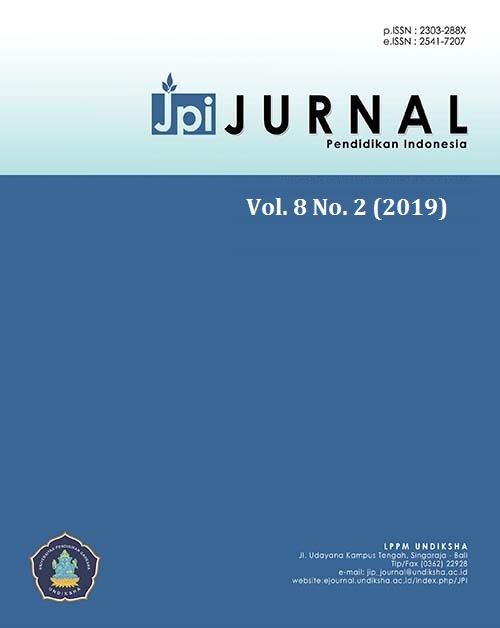Spectrum of Social Studies: Testing of the Social Reconstruction Vygotsky's Paradigm in Elementary Schools Social Studies Learning
DOI:
https://doi.org/10.23887/jpi-undiksha.v8i2.19231Keywords:
Spectrum, Social Studies, Social Reconstruction Theory, Primary SchoolAbstract
In General, this research aimed to develop new formula of ideas and hypotheses of social science education curriculum of primary school. The Development was done through the integration of the principles of social reconstruction and constructivism of Vygotsky in interactional construction. This research used the design of development research, conducted in Bali Province by involving education experts, principals, teachers, and primary school students as research samples determined by purposive-randomization. The data instruments of this research consisted of observation sheets, interview guides, questionnaires, and test of learning outcomes. The whole research data was analyzed qualitatively with an interactive cycle model and CAR (contextuality-accuracy-relevancy) model, combined with quantitative analysis to comparatively graded the advantage of social reconstruction design with conventional learning design in social science education of primary school. The result of the study indicated that: (1) the social science competency which allowed for students of primary school in accordance with the social constructivism design of Vygostky consisted of : personal competence, sociocultural, and intellectual competence, (2) the relevant social science material structure to develop was when systematically organized as real pedagogical learning experiences, sociocultural, psychologycal by relied on the principle of “a student’s as a psychological, sociocultural, and intellectual horizons reconstructions -based”, and (3) social science classroom environment was a psychological and sociocultural context that should be laid out and directed at efforts of : (a) dynamization of student position from natural position to sociocultural position; (b) provide facility and personal and sociocultural mediation to students in their endeavors to reconstruct the contents, functions, and operations contained within their personalities structure.
References
Abijhani, P.V. (2006). The Social Studies Breaking Concepts. tersedia di: www.spartan.ac. brocku.ca/~lward/ dewey/dewey1910.html [diakses tanggal 10 Januari 2006].
Banks, J.A. (1995). Transformative Challenges to the Social Sciences Disciplines: Implications for Social Studies Teaching and Learning.. Theory and Research in Social Education, XXIII(1), 2-20.
Bruner, J.S. (1969). After John Dewey, What?. dalam R.D. Archambault. (2d). Dewey on Education: Appraisals. New York: Random-House. 211-227.
Bruner, J.S. (1978). The Process of Education. Cambrigde: Harvard University Press.
Buchori, M. (2001a). Pendidikan Antisipatoris.Yogyakarta: Kanisius.
Cornbleth, C. (1991). Research on Context, Research in Context. dalam Shaver, J.P. (ed). Handbook of Research on Social Studies Teaching and Learning. New York: Macmillan Publishing Company. 265-275.
Depdiknas. (2006). Kurikulum Tingkat Satuan Pendidikan. Jakarta: Depdiknas.
Dewey, J. (1964). Democracy and Education: An Introduction to the Philosophy of Education. New York: Mcmillan Co.
Farisi, M.I. (1997). Pengembangan Pembelajaran Pendidikan IPS-SD Berdasarkan Penggunaan Konsep Siswa. Tesis S2, Bandung: PPS IKIP Bandung.
Gagne, R.M. (1977). The Conditions of Learning. New York: Holt, Rinehart & Winston.
Hasan, S.H. (2002). Pendidikan Sering Hanya Sebatas Transfer Ilmu: Tidak Membangun Karakter Siswa dan Nilai Sosial. Pikiran Rakyat, 29 Nopember 2002.
Kozulin, A. (1998). Psychological Tools: A Socio-cultural Approach to Education. London: Harvard University Press.
Lincoln, Y.S. & Guba, E.G. (1985). Naturalistic Inquiry. London: SAGE Publications.
NCSS. (2004). Science-Technology-Society (STS) in Social Studies: Position Paper. Washington DC: NCSS.
Nitko, V.S. (1918). The Revolution of Social Concept. USA: Agraware Ltd.
Downloads
Published
Issue
Section
License
Authors who publish with the Jurnal Pendidikan Indnesia agree to the following terms:
- Authors retain copyright and grant the journal the right of first publication with the work simultaneously licensed under a Creative Commons Attribution License (CC BY-SA 4.0) that allows others to share the work with an acknowledgment of the work's authorship and initial publication in this journal.
- Authors are able to enter into separate, additional contractual arrangements for the non-exclusive distribution of the journal's published version of the work (e.g., post it to an institutional repository or publish it in a book), with an acknowledgment of its initial publication in this journal.
- Authors are permitted and encouraged to post their work online (e.g., in institutional repositories or on their website) prior to and during the submission process, as it can lead to productive exchanges, as well as earlier and greater citation of published work. (See The Effect of Open Access)








